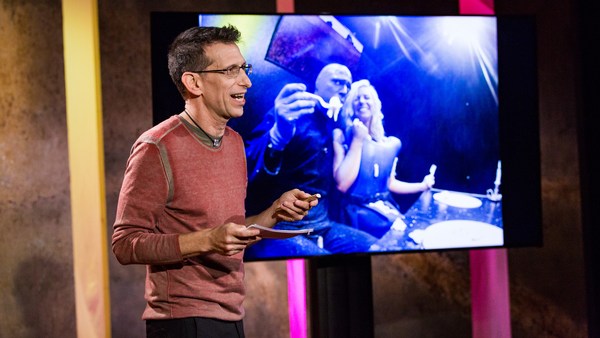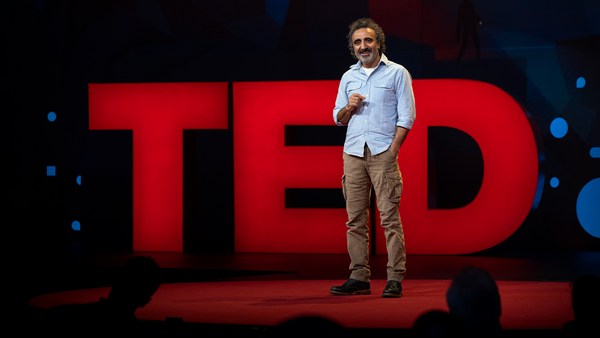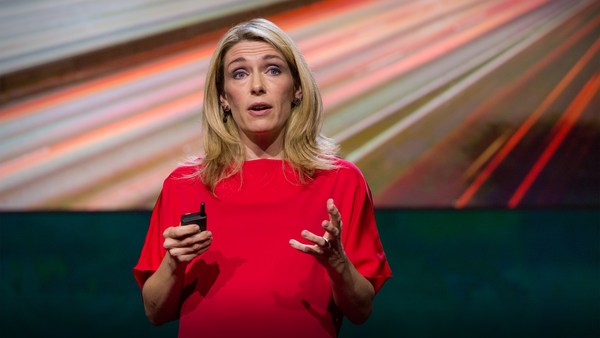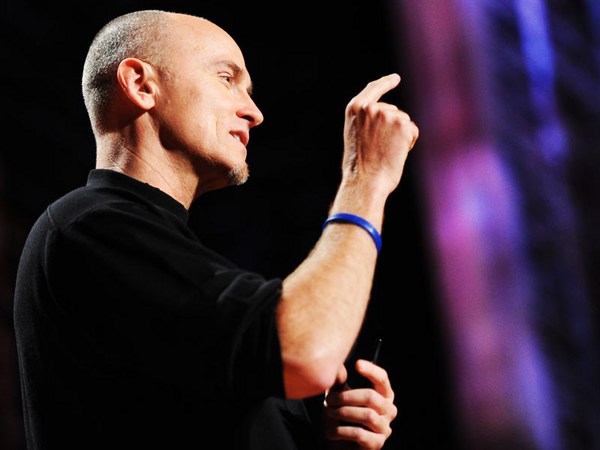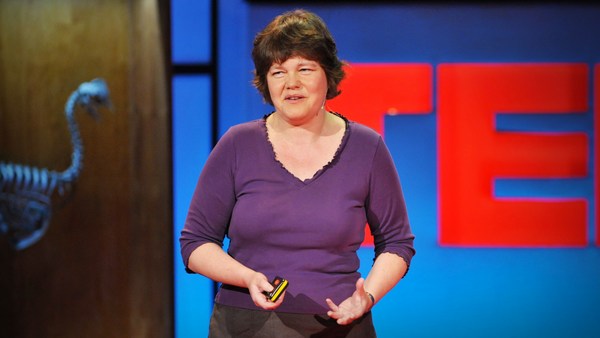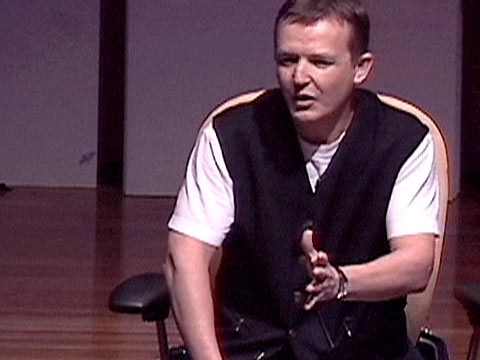For nearly a decade, I owned and operated a restaurant called Eleven Madison Park. To give you some context, if you don't know what that is, Eleven Madison is a very fancy restaurant on the corner of 24th and Madison here in New York City. I mean, like very fancy. We're talking servers wearing suits and ties, like, crisp, ironed white tablecloths. More than 30 cooks in the kitchen serving like 10-, 15-course tasting menus. I think you get the gist. When I got there in 2006, it was kind of a middling brasserie. But by the time I sold it at the beginning of 2020, it had been named the number one restaurant in the world.
(Applause)
Now, to be clear, our kitchen served unbelievably delicious and incredibly innovative food. Our service was so gracious and as close to technically perfect as possible. And our dining room ... I mean, just Google a picture. It's one of the most beautiful out there. And it was because of those reasons that we were consistently on the list of the 50 best restaurants in the world. But it was a hot dog that earned us the number one spot on that list. Or rather, the winning strategy that it gave birth to: unreasonable hospitality. The principle that guided us as we took ordinary transactions and turned them into extraordinary experiences.
In early 2010, on a busier-than-normal lunch service, I was in the dining room helping out the servers when I found myself clearing appetizers from a table of four foodies on vacation to New York. And they were going to the airport to head back home after their meal. I overheard them talking. "What an amazing trip. We've been to all the best restaurants." And they listed a bunch: “Per Se, Le Bernardin, Daniel, Momofuku, now Eleven Madison Park.” Then another person jumped in: "Yeah, but the only thing we didn't get to try was a New York City hotdog."
You know those moments in a cartoon where the animated light bulb goes off over the character's head, signifying they're about to come up with a really good idea? If you’d been in the room with me that day, you would have seen one appear over mine. As calmly as I possibly could, I walked gracefully back into the kitchen, dropped off the plates, and then literally ran out the front door and down the block to the hotdog cart. I bought a hotdog and ran just as fast back into the kitchen. Now came the hard part: convincing the chef to serve it in our fancy fine dining restaurant. Guys, he looked at me like I'd lost my mind. Serving what New Yorkers call "a dirty water dog" in a fancy four-star restaurant? But I asked him to trust me and I told him it was important to me. And eventually he agreed to cut the hotdog up into four perfect pieces, adding a little swish of ketchup and a swish of mustard onto each plate and finishing them with a quenelle of sauerkraut and a quenelle of relish.
Then, before we served at the table their final savory course -- which happened to be a honey-lavender glazed Muscovy duck that had been dry aged for two weeks, utilizing a technique that had taken years to perfect -- we brought them their hot dog. I introduced it. "To make sure you don't go home with any culinary regrets, a New York City hotdog."
Guys, they freaked out.
(Laughter)
I'm not kidding. At that point in my career, I had served thousands of dishes and many, many, many thousands of dollars worth of food. And I can confidently say that no one had ever reacted to anything I served them better than they reacted to that hotdog. Each person said it was not only the highlight of their meal, but of their entire trip to New York, and they'd be telling the story for the rest of their lives.
See, that hotdog changed the way I approach restaurants from that point forward. Because up until then, I had been so focused on excellence, on all the little details that go into making a meal great, that I somehow hadn’t realized something really important: That in restaurants, our reason for being is to make people feel seen. It's to make them feel welcome. It's to give them a sense of belonging. See, in restaurants, the food, the service, the design, they're simply ingredients in the recipe of human connection. That is hospitality. And I realized, if we could be unreasonable in our pursuit of that, we could give people the kind of experiences they would remember forever. It was only then that I realized I wasn't actually in the business of serving people dinner. I was in the business of serving them memories.
I obsessed over that hot dog. I kept on going back to the experience and trying to figure out what happened [so] that the whole thing went down, what happened so that it could happen and what needed to happen so that it could start happening all the time.
First, being present. Which I get, it's like, kind of overused these days. But for me, being present means caring so much about the thing you're doing or the person you're with that you stop caring about all the other things you need to do. And it's essential in delivering unreasonable hospitality. See, so often we have such long to-do lists that we aren't able to slow down enough to actually listen to the people around us, to the things they're saying and all the things they're not saying. If I hadn't been present at that table, I never would have heard that throwaway line about the hot dog.
Second, it required taking what you do seriously without taking yourself too seriously. Way too often in customer service businesses, we let these self-imposed standards get in the way of us giving our customers the thing they actually want. OK, a hotdog in a four-star restaurant is sacrilegious. But look at the way it made them feel.
And third, it required the acknowledgment that if what you're trying to do is give people a sense of genuine belonging, one size fits one. Hospitality is about making people feel seen. And the best way to do that is not to treat them like a commodity, but as a unique individual. I really do believe I could have comped that table a bottle of vintage champagne and given them a free bucket of caviar, and it would not have had the same impact as that two-dollar hotdog. Because it would not have been specific to them.
The hot dog had given us a new true north. And now we had a road map. I started talking about it constantly at staff meetings, telling the team what led to the gesture and encouraging them to go out into the dining room to find opportunities of their own. And they were just as fired up as I was. And we got started right away. Every night, finding a few really cool experiences to deliver to our guests. We had unlocked something important. We knew it was working, but we wanted more of it. We wanted to give these kinds of things to almost everyone. We wanted to make it a bigger part of our culture. And we recognized that we needed to invest in the resources to make that possible.
So, we added a position to the team, someone whose only responsibility was to help everyone else bring their ideas to life. We called the position the Dream Weaver, named after the iconic song by Gary Wright. You've heard it, even if you don't think you have. I'll help you. It goes something like, (sings) Ooh, dream weaver.
(Laughter)
Oh, sorry --
(Applause)
I just had to sing it because that song is actually pretty important to me, it was playing the first time I kissed a girl. It will now be stuck in your head for the rest of the day, you're welcome.
And with the addition of that position, we were on fire. Sincerely, a guest warned us in advance that his dad was more of a Budweiser steak-and-potatoes kind of guy than Sauternes and foie gras, so the Dream Weavers turned our fancy champagne cart into a Budweiser cart, filled with every available type of Budweiser at every bodega in the neighborhood.
(Laughter)
A couple came in to console themselves after their beach vacation flight was canceled. So at the end of their meal, we turned our private dining room into their very own private beach with reclining folding chairs, a ton of sand on the ground, and a kiddie pool filled with water they could dip their feet into while they drowned their sorrows over tropical mai tais with those little umbrellas.
Or a family of four from Spain was in the restaurant. They were in New York on vacation. And while they were eating, the most beautiful thing happened. The kids were looking out our massive windows with wonder. It had started snowing and it was the first time they'd ever seen real snow. The Dream Weaver found a store that was open at eight o’clock on a Friday night. When they left the restaurant, there was a chauffeur-driven SUV waiting to take them to Central Park for the most special nightcap: a few hours of play in the freshly fallen snow.
With these gestures and so many more, our guests were obviously happier than ever, but you know what? This is the cool part, so was our team. Because for the first time, they had creative autonomy. They were no longer just helping to execute someone else's vision, serving plates of food someone else had created. They were coming up with their own ideas, and those ideas were affecting the guest experience. They were empowered. But mostly, I mean, we were all just happy because we were making other people really, really happy. There are few things more energizing than seeing the look of complete joy on someone's face when they receive a gift that you are responsible for giving. It can become one of the most beautiful addictions. And as we all found ourselves quickly becoming addicted to going above and beyond for our guests, we found ourselves going above and beyond for one another as well.
Now I'm going to say this because I'm sure some people are thinking it: unreasonable hospitality is not just for fancy restaurants. I get it, some of the gestures I just described were quite extravagant. We did hire people onto the team to help us execute them more consistently. But remember, that hotdog only cost two dollars, and the impact it had was priceless. It does not take a big budget to start infusing this into your culture, because remember, it's not the cost of the gesture that matters. It's how it makes people feel.
For most of America's history, we were a manufacturing economy. Now we're a service economy and dramatically so. More than three quarters of our GDP is driven by service industries. Globally, it's more than 65 percent. That means that whether you're in real estate or retail or construction or finance or insurance or computer services, you do the same thing for a living that I do. You’re in the business of serving other people. And if you start to look closely enough, you will find opportunities for unreasonable hospitality, to give people more than they could ever possibly expect all around you.
Take real estate agents, for example. Every time I've bought or rented a new apartment, at best, the agent has left me a bottle of sparkling wine in the fridge as my thank you/congratulations gift. At worst, they've just thrown the keys on the kitchen counter. Now, this is someone with whom I've spent weeks, if not months, looking together for my new home. If they've been paying attention, they should know every intimate detail of my life. So imagine instead, if the first time my wife and I walked into the apartment that we ended up choosing, they overheard her talking about the nook she imagined herself doing yoga every morning. And when we moved in, instead of that obligatory bottle of bubbles, in that nook was a brand new yoga mat with a candle and a note that said "Welcome to your new home." I think that would be pretty cool. And compared to the average commission, it's a pretty insignificant investment in what will inevitably become a lifelong relationship.
This is not rocket science. It just requires caring a little bit more and trying a little bit harder. Being present, not taking yourself too seriously and remembering that one size fits one.
Just go with me here. Imagine if the person that checked you into the dentist's office started thinking like this. Imagine if the person that sold you your next car started thinking like this. Or better yet, imagine if everyone on your entire team started thinking like this. Because making good products, it's no longer enough. Serving them efficiently is no longer enough. It's how we make people feel that matters most of all. Because I believe we are on the precipice of becoming a hospitality economy.
Listen, unreasonable hospitality helped my restaurant accomplish every single one of our goals, and it turned the people I worked with from a collection of individuals into a trusting team, unlocking a collective creativity and capacity we had never experienced before. So the next time you find yourself pursuing a relationship with someone you work with or someone you serve, I'm just here to encourage you to try being a little bit more unreasonable.
(Laughter)
Give people that sense of belonging. Give them a memory that can last a lifetime. It will transform your business. But I can also promise you this. It will make you and all the people around you feel really, really, really good.
Thank you.
(Applause and cheers)
